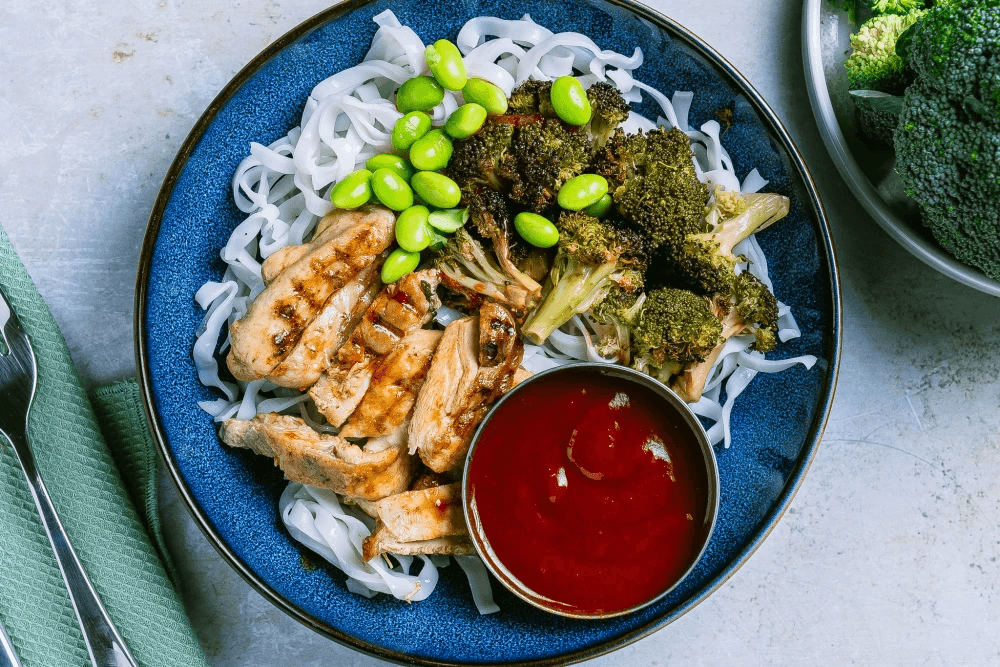Ozempic is a prescription-only drug that is, like other similar medications such as Wegovy and Mounjaro, primarily administered to help manage type 2 diabetes. They should only be used with medical advice and a prescription from your doctor. Maintaining a healthy lifestyle while taking these drugs is essential - eating a balanced diet with the right nutrients and calories, especially when combined with regular exercise, can help get the best results. However, many people are unsure about what to eat when on Ozempic, so we've compiled a guide detailing the best foods to eat when on Ozempic, foods to avoid on Ozempic, and key lifestyle tips to support your health journey.
Understanding Ozempic and its role in weight management
Although Ozempic and other drugs in this category are primarily intended for diabetes management, they have also been found to encourage weight loss in users. Ozempic and Wegovy contain semaglutide, a compound mimicking a natural hormone called GLP-1 (glucagon-like peptide-1). GLP-1 plays a key role in weight management by slowing down the passage of food from the stomach, helping to maintain a feeling of fullness after eating. It also works in the brain on the signals that control appetite, so it encourages people to eat less often and to need smaller meals. Ozempic is approved for use in diabetes, but Wegovy is also approved to aid weight loss programmes, where being overweight is thought to be causing or increasing the risk of serious health issues.(1,2)
Additionally, Ozempic inhibits glucagon, a hormone produced by the pancreas that signals the liver to release glucose (sugar) into the bloodstream. By reducing this release, Ozempic helps prevent spikes in blood sugar levels which may lead to sugar cravings. Mounjaro, and sister drug Zepbound, contain tirzepatide, which has similar effects, but is also a GIP receptor agonist. GIP - short for glucose-dependent insulinotropic polypeptide - also affects satiety, appetite, and insulin levels. (2,3)
For best results, it's most effective to take all these types of medications in combination with a healthy eating plan.

Importance of a balanced diet on Ozempic
Maintaining a healthy supporting diet while taking Ozempic helps to aid the medication's positive effects. A balanced meal plan includes nutrient-rich foods and focuses on consuming the right proportions of macronutrients—carbohydrates, proteins, and fats—to ensure the body receives essential nutrients while supporting weight and blood sugar management [4].
Macronutrient Breakdown
Hitting daily macro targets is essential while taking Ozempic to maintain stable blood sugar levels, promote satiety, and support overall health.
- Carbohydrates: Focus on non-starchy vegetables and whole grains to maintain stable blood sugar levels and avoid the peaks and troughs that cause sugar cravings [3].
- Proteins: Incorporate lean protein sources such as chicken, fish, and legumes to support muscle health and promote feelings of fullness [4].
- Fats: Choose healthy fats like oily fish, avocados, nuts, and olive oil while avoiding high-fat processed foods, which may increase the risk of gastrointestinal discomfort [5].
Caloric intake and weight management when taking Ozempic
For effective weight management while on Ozempic, it's important to monitor your daily caloric intake. While the focus is typically on reducing the number of calories eaten, it is equally as important to ensure that enough calories are consumed to provide the right levels of nutrients, help prevent muscle loss, and ensure adequate energy levels [8], so it's important to eat the right amount for your individual needs.
Setting Caloric Goals
- Calculate your daily caloric needs: Base your caloric intake on age, gender, activity level, and weight loss objectives. Tools such as calorie calculators can help determine these targets [7] but if you intend to lose a significant amount of weight or have any health conditions, you should determine these targets with the help and guidance of your doctor and a dietitian or other qualified nutrition professional.
- Create a sustainable calorie deficit: For weight loss, aim for a calorie deficit that is manageable long term to avoid extreme hunger or fatigue [8].
Read our article about how to work out your ideal calorie intake.
Foods to include and avoid when taking Ozempic
The best foods to eat while on Ozempic are those that support your individual health goals and work with the action of the medication. E.g. when the drug is prescribed for weight loss, it's typically used in combination with a calorie-controlled diet, and when used for diabetes management, the diet should be designed to help regulate blood sugar. Selecting the right foods can enhance the benefits of Ozempic and support overall health [4], though any supporting diet should follow some basic principles:
Foods to include:
Foods to include:
- High-fibre foods: Incorporate fruits, vegetables, and whole grains to support digestion, promote fullness, and maintain stable blood sugar levels [9]. Read this article to learn more about the benefits of fibre.
- Lean proteins: Include sources like poultry, fish, and plant-based proteins to support muscle maintenance and satiety [10]. Find out how protein can support weight loss and blood sugar balance.

Foods to avoid:
- Processed foods: Limit intake of processed and high-fat foods to prevent gastrointestinal discomfort, overconsumption, and support stable blood sugar levels [11].
- Added sugars: Avoid foods with high added sugar content to reduce the risk of blood sugar spikes, which may counteract the effects of Ozempic [12]. Read our blog to find out if you’re eating too much sugar.
Managing the side effects of Ozempic
While taking Ozempic, some individuals may experience side effects such as nausea, diarrhoea, constipation, or other gastrointestinal issues[1,2]. To mitigate these effects, it's recommended to consume a diet rich in whole foods, stay hydrated, and avoid overly processed or greasy meals. Increasing your fibre intake can be a good idea to support your good gut bacteria and overall digestive health, though if you find your symptoms get worse after eating certain foods, it can be worth keeping a food diary.
The importance of hydration
Because it may cause gastrointestinal upsets, Ozempic might also affect hydration levels in some people. People experiencing nausea as a side effect might find they don't want to eat or drink as much as they should. As well as nausea, if you experience ongoing diarrhoea as a side effect of Ozempic, this can also cause dehydration as you're constantly losing fluids. Additionally, although it's not a confirmed side effect, some people on Ozempic report that they pass urine more often[15].
Consequently, it is important to monitor your symptoms and keep an eye on your fluid intake when you're on Ozempic.
Read our blog to find out if you're drinking enough water
Conclusion
Staying healthy while taking Ozempic involves a balanced approach to diet and lifestyle. By focusing on nutrient-dense foods, maintaining a proper caloric intake, and managing potential side effects, individuals can optimise their health and achieve their weight management goals. Consider subscribing to a healthy meal prep subscription which can make it easier to monitor your calories, eat a nutritious diet, and support your weight loss goals. Explore our range of delicious and balanced weight management meal plans.
If you enjoyed this article, read these other related articles on our blog:
How to eat healthy when eating out
How to set new personal goals with Katarina Johnson-Thompson
Reference list:
1. Wilding, J. P. H., Batterham, R. L., Calanna, S., Davies, M., Van Gaal, L. F., Lingvay, I., ... & Kushner, R. F. (2021). Once-weekly semaglutide in adults with overweight or obesity. New England Journal of Medicine, 384(11), 989-1002.
2. Novo Nordisk. (2024). Ozempic (semaglutide) injection, for subcutaneous use: Prescribing information. Novo Nordisk. https://www.novo-pi.com/ozempic.pb,
3. Jenkins, D. J. A., Kendall, C. W. C., Augustin, L. S. A., Franceschi, S., Hamidi, M., Marchie, A., ... & Axelsen, M. (2002). Glycemic index: overview of implications in health and disease. The American Journal of Clinical Nutrition, 76(1), 266S-273S.
4. Layman, D. K., Clifton, P. M., Gannon, M. C., Krauss, R. M., & Nuttall, F. Q. (2008). Protein in optimal health: heart disease and type 2 diabetes. The American Journal of Clinical Nutrition, 87(5), 1571S-1575S.
5. Calder, P. C. (2006). n−3 Polyunsaturated fatty acids, inflammation, and inflammatory diseases. The American Journal of Clinical Nutrition, 83(6), 1505S-1519S.
6. Hall, K. D., Heymsfield, S. B., Kemnitz, J. W., Klein, S., Schoeller, D. A., & Speakman, J. R. (2012). Energy balance and its components: implications for body weight regulation. The American Journal of Clinical Nutrition, 95(4), 989-994.
7. Mifflin, M. D., St Jeor, S. T., Hill, L. A., Scott, B. J., Daugherty, S. A., & Koh, Y. O. (1990). A new predictive equation for resting energy expenditure in healthy individuals. The American Journal of Clinical Nutrition, 51(2), 241-247.
8. Wing, R. R., & Hill, J. O. (2001). Successful weightl loss maintenance. Annual Review of Nutrition, 21, 323-341.
9. Slavin, J. (2013). Fiber and prebiotics: mechanisms and health benefits. Nutrients, 5(4), 1417-1435.
10. Phillips, S. M. (2012). Dietary protein requirements and adaptive advantages in athletes. British Journal of Nutrition, 108(S2), S158-S167.
11. Monteiro, C. A., Cannon, G., Moubarac, J. C., Levy, R. B., Louzada, M. L. D. C., & Jaime, P. C. (2018). The UN Decade of Nutrition, the NOVA food classification and the trouble with ultra-processing. Public Health Nutrition, 21(1), 5-17.
12. Malik, V. S., Popkin, B. M., Bray, G. A., Després, J. P., Willett, W. C., & Hu, F. B. (2010). Sugar-sweetened beverages and risk of metabolic syndrome and type 2 diabetes: a meta-analysis. Diabetes Care, 33(11), 2477-2483.
13. Medical Health Authority (n.d.). Is Ozempic a Diuretic? Everything You Need to Know. Retrieved December 13, 2024, from https://medicalhealthauthority.com/info/peeing-a-lot-on-ozempic-causes-symptoms-solutions-2.html




